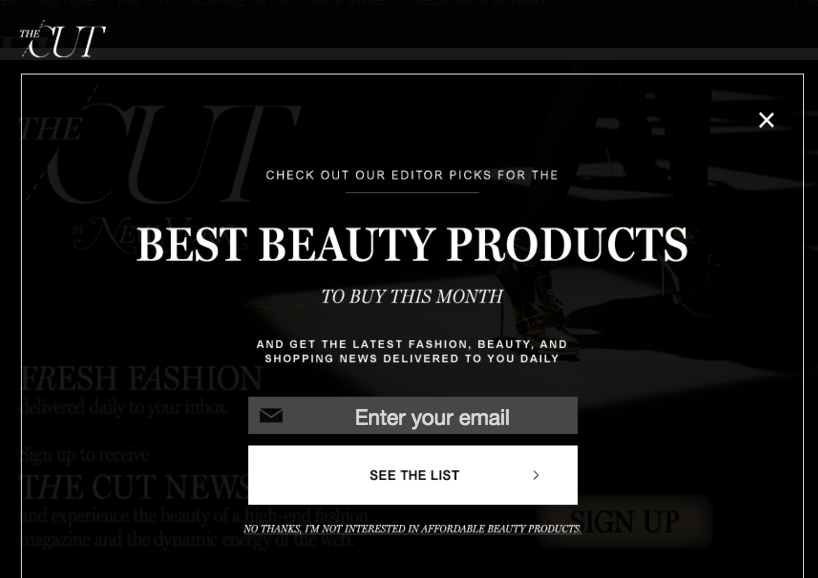"No thanks, I'm not interested in protecting my skin." —Elle.com
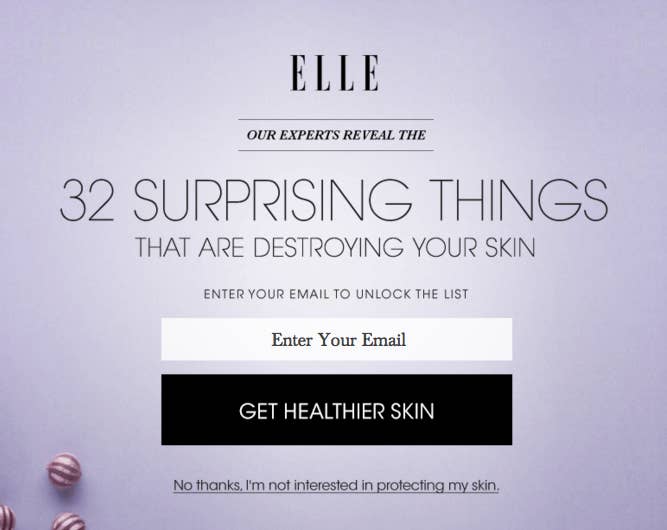
Thus far, 2016 is shaping up to be the year of a new and terrifying phase of the user interface design: the shame and guilt spiral as a feature.
Freud believed that it was during the latency stage of psychosexual growth of a child (approximately between toddlerhood and puberty) that shame and guilt entered their awareness and became motivating emotions. To believe that the UI is at that point, we have to believe that we have already passed toddlerhood with its Oedipal complexes, been weaned from our mother's teat, and put to rest our fixations on poop. To be fair, I am not sure if the internet will ever be over DILFs, boobs, and poop jokes, but I do believe there is clear evidence we are moving in this direction.
Last year, Facebook changed the response options to its events to reflect the guilt that these damned invites have caused us to feel for years. Instead of just a firm "No," the option is now "Can't go." It's making your polite excuse for you. The option to let someone know you will never ever go to their DJ night/poetry slam/dog birthday because you just don't WANT to no longer exists. In this case, Facebook is removing the guilt you might feel for declining the invitation. You'd love to, you just can't make it.
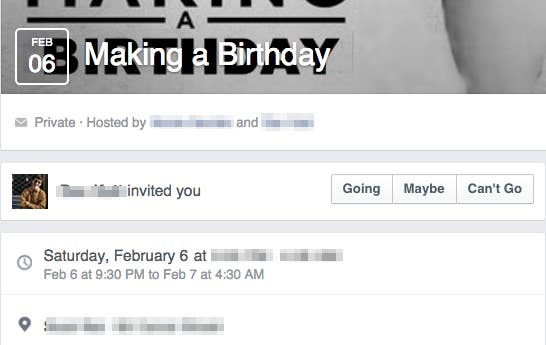
On the other hand, take the ad blocker. Many of us would prefer to never see ads. We hate ads! But, of course, that's what keeps the lights on at media websites. Which is why some websites seem to be turning to guilt to get you to turn those ad blockers off: Please, don't you want our site to be able to thrive?
This guilt strat isn't just locked in the primordial garden of several argumentative Medium thinkpieces. It is actually built into sites themselves. It manifests as cute little images that appear on various sites when they detect readers have ad blockers turned on. On Twitter, people recently complained that Forbes was strategically shaming them with Martin Shkreli quotes (clearly designed to torture the ad-blocking reader into madness). But other sites like GQ.com go with a more straightforward guilt-inducing approach.
The guilt-inducing ad-blocker filler image. "Please support GQ's Award Winning Journalism!"
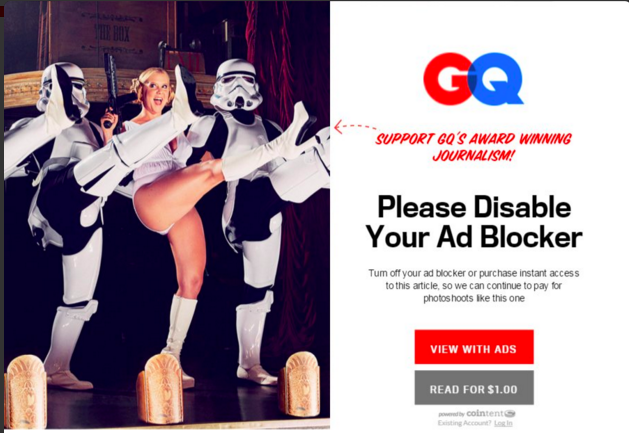
The worst shame offender of all, however, is quickly becoming the mailing list opt-out guilt trip. When visiting a website, a pop-up implores you to sign up for their fantastic mailing list. The only way to get rid of this list is to click on the fine print at the bottom. But too often, this doesn't merely say "Opt out" or "No thanks."
No. It forces you to click a statement acknowledging you are a terrible, deplorable, disgusting human being.
It is not just enough that you don't want to subscribe to the mailing list about political news. You must admit that "no, I DON'T care about being well-informed and reading great journalism."
To be fair, it's not unreasonable that a website would want put the screws on you to join its email list. For e-commerce sites, mailing lists are a huge driver of revenue. For media websites, a well-done newsletter can be a crucial source of traffic. Consider this: the amount of traffic BuzzFeeds gets from our newsletters is almost as much as we get from Twitter. Not just our own Twitter account, but all of Twitter.
"No thanks, I want to pay full price." —Hotels.com
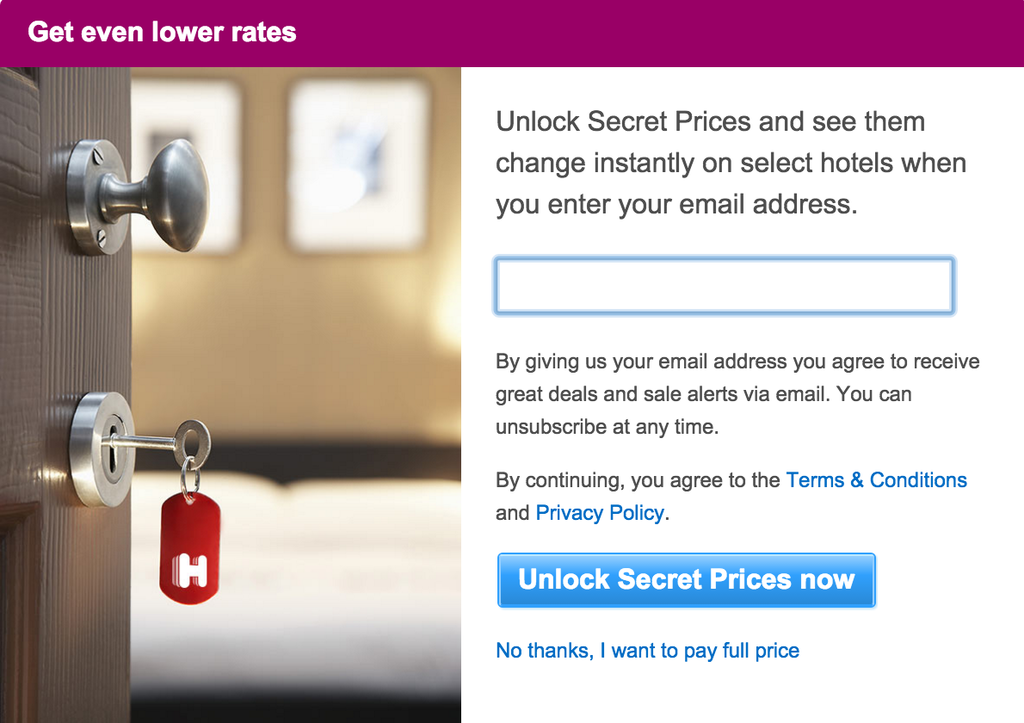
The fact is, yeah, we probably ought to feel a little guilty about what we've gotten up to on the Internet in the last few years. I mean, look at your Google history (seriously, you are sick). But that private self-loathing that's been the fire for so many great moments should be, well, private. Let US hate ourselves. Let US create awkward social situations with acquaintances. Let US off the hook for not treating our inboxes like the pile of unread New Yorkers that already cause us internal shame. We feel plenty bad already.
The privacy of the internet has long been our guilty pleasure. It's where respectable folks pore over the details of Kyle Jenner's makeup or let ourselves feel smug about our ex's new partner's terrible Instagram. Even for creeps, it's where they can go to do their creepiest things! Where else can you proudly post pics of your collection of pissjugs (jugs of pee you keep in your room because you're too busy gaming to get up to pee) if not 4chan?
We already feel like shit when we're on the internet half the time. Please don't design these things to make us feel more ashamed that we already are.
"No thanks, I'm not interested in affordable beauty products." —The Cut, NYMag.com
